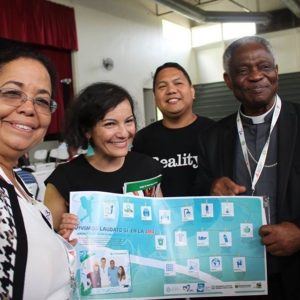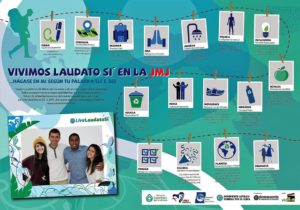
At World Youth Day in Panama City, 2019, young people opened a new chapter in the history of action on climate change. Youth participants and senior Church leaders came together across several days to craft a manifesto calling for “everyone, ourselves first, to urgently act to protect our planet and the poorest and most vulnerable people.” The manifesto was presented to Cardinal Tagle, who is the archbishop of Manila and the president of Caritas Internationalis, the Vatican’s social service agency. Cardinal Tagle accepted the manifesto on the behalf of the Church.
1) The injustice towards the poor of today and the future generations
Our future and the future of those who will come after us is in grave danger. For a long time, humanity has embarked in an irresponsible path of environmental destruction that still makes our present precarious and affects the future. First, because of the climate we are already seeing devastating climate impacts across continents with the rise of average global temperature by 1°C. The planet now risks surpassing the catastrophic threshold of 1.5°C of global warming if the Paris Agreement won’t be implemented urgently and at all levels. Second, the biodiversity crisis has already led us in the midst of the sixth mass extinction, with animal and vegetal species going irreversibly extinct. In this respect, we are reminded by the Latin American Bishops and the Preparatory Document of the Amazon Synod that indigenous peoples have a critical role to play in protecting their ancestral homelands from indiscriminate exploitation activities. Moreover, other no less important related crisis such as the water crisis make the state of our common home even more alarming.
In the encyclical Laudato Si’ it is underlined that the“doomsday predictions can no longer be met with irony or disdain. We may well be leaving to coming generations debris, desolation and filth” (LS 161). As bishops from all continents have acknowledged, [the present] “generation is not doing enough to leave them a healthy planet. Being so short-sighted is an unacceptable injustice.”
We are mindful that the ecological crisis is not only an intergenerational injustice, but also an intragenerational injustice towards the poor and most vulnerable people. As Pope Francis wrote, “both everyday experience and scientific research show that the gravest effects of all attacks on the environment are suffered by the poorest” (LS 48). That is how the migration crisis is closely related to environmental destruction: “Many of those who can least afford it are already being forced to leave their homes and migrate to other places that may or may not prove welcoming.” Time is running out and leaders from all sectors are showing very low ambition to embark in the rapid transformation that is needed to protect our precious common home and all its inhabitants.

2) An authentic and urgent ecological conversion
We recognize that the ecological crisis is a symptom of a deeper crisis in the human heart, which reminds us of the prophetic call of St John Paul II to “encourage and support the ‘ecological conversion’ which has made humanity more sensitive to the catastrophe to which it has been heading.” We pray that this pilgrimage to Panama may prove an important milestone in the ecological conversion of all World Youth Day pilgrims, as it is imperative for us Christians to rediscover the role of creation care in our faith: “Living our vocation to be protectors of God’s handiwork is essential to a life of virtue; it is not an optional or a secondary aspect of our Christian experience” (LS 217).
Mindful of our share of responsibility in deepening the ecological crisis, there is a profound need for repentance. In the words of Pope Francis, “a healthy relationship with creation is one dimension of overall personal conversion, which entails the recognition of our errors, sins, faults and failures, and leads to heartfelt repentance and desire to change” (LS 218).
The Church has a critical role to play in advancing this ecological conversion within the Church itself and in all the social, economic, political and institutional realities. We are encouraged by the way Laudato Si’ is wellspring of effective action to call on everyone to care for creation, with countless initiatives around the globe that are driving transformative action for an integral ecology. But the urgency is such that much more needs to be done, by everyone and with greater immediacy.
3) The role of young Catholics
As the Synodal Fathers recognized, among young people “there is strong and widespread sensitivity to ecological themes and sustainability, that the encyclical Laudato Si’ has galvanized.” Most importantly, this sensitivity translates into an appeal to the ruling classes to act because “Young people demand change” (LS 13). Indeed, there is a vibrant youth movement that is rising up across the globe, challenging the generation in power to take climate change and the ecological crisis more seriously. Young activists are taking unprecedented action, ranging from “climate strikes” of high school students to lawsuits against governments for not doing enough to tackle climate change.
In this context, we young Catholics are also stepping up as never before. We take seriously the Laudato Si’ call for “radical decisions to reverse the trend of global warming” (LS 175) and we are inspired by the prophetic voice of fellow young activists for the environment. As the Synodal Fathers well summarized it, “young people wish to offer the fruits of their talents, skills and creativity and they are ready to assume responsibility, inspired by the experience of the elderly and the rich cultural and spiritual tradition of our Church.
 4) Our Commitments
4) Our Commitments
We are mindful that we, young Catholics, are not doing enough. Despite commitments assumed in earlier Laudato Si’ conferences on the safeguard of Creation at World Youth Day 2013 and 2016, we still are not mobilizing enough for our common home. Namely, our commitments are the following:
- We will strive to live Laudato Si’ in the concreteness of our own daily lives, by developing an “ecological spirituality” (LS 216) and adopting sustainable lifestyles. Change is possible even with small daily actions like “avoiding the use of plastic and paper, reducing water consumption, separating refuse, cooking only what can reasonably be consumed, showing care for other living beings, using public transport or car-pooling, planting trees, turning off unnecessary lights, or any number of other practices” (LS 211).
- We will study and better understand the ecological issue, in the quest to better prepare ourselves to advance the transformation that is needed at all levels: in our families, schools, universities, work environments, sport circles, through media and culture etc.
- We will faithfully challenge Bishops and Church leaders to take more seriously the ecological crisis. Encouraged by Pope Francis’ appeal for us young Catholics to make “Lío” (which means “trouble, mess” in Spanish); we will be creative and positive “troublemakers” in our parishes, dioceses and communities, to help the Church move out of indifference and comfort zone.
- We will support the Church by offering our time and talents to animate our communities to better care for creation; we will collaborate, also at a wider level, to raise a prophetic voice calling for more action from political leaders, given that the Church “must assert this responsibility in the public sphere [to] protect mankind from self-destruction” (Caritas in veritate, 51).
- We will stand in solidarity and in collaboration, without losing our identity and integral understanding of problems, with all the ones who are bravely protecting our common home, as the wider environmental movement and other realities.
- To concretely change, it will be important to work together. Unity is strength. This is the spirit leading to the launch of the “Laudato Si’ Generation”, a new network of young Catholics to coordinate our common efforts, learn from each other and maximize everyone’s contribution.

5) Our Demands
We call on bishops and Church leaders to accelerate the implementation of Laudato Si’ by:
- Encouraging ongoing ecological conversion through educational and formation programs at all levels, accompanied by special initiatives to nurture the ecological dimension of our faith, also through the annual Season of Creation celebration. It is, therefore, necessary to overcome an often marginal and episodic interest and to move towards a systematic and organic commitment.
- Promoting a conversion of lifestyles to simplicity and sustainability, through the commitment of ecclesial structures for a transition to 100% renewable energy and achieve net zero carbon emissions by 2030 or earlier.
- Adopting ethical investment guidelines driving assets away from from fossil fuels (“divestment”) given that, to respect the temperature limit posed by the Paris Agreement, we need to “keep most fossil fuels underground”; as stated in the Youth Synod final document (153).
- Leveraging the recent Synod on Young People and the preparatory works for the Synod of the Amazon, it is needed to meaningfully empower young people to lead creation care programs and, in particular, to advance defence projects for that “lung of the planet” (LS 38) that is the Amazon forest and its inhabitants.
We also call on political leaders and competent institutions to take seriously and urgently the main scientists’ warnings, by:
- Achieving 100% renewable energy to “put an end to the fossil fuel era” in line with the Paris Agreement goal of limiting global warming to 1.5°C.
- Implementing the Global Compact for Migration, to deal with environmental refugees so that “nobody is left behind”.
- Protecting at least 30% of the planet’s ecosystems by 2030, with special attention to the indigenous communities living in those biodiverse regions, in application of the U.N. Convention on Biological Diversity,
- Actively committing for a universal and fair access to drinking water by 2030, as foreseen in the SDGs goal 6 (Sustainable Development Goals of the UN 2030 Agenda)
- Adopting a “circular economy” model, to challenge the “modern myth of unlimited material progress” (LS 78) and the “unlimited growth” (LS 106) paradigm.
We invite young Catholics everywhere to join us, beyond the differences, to take care for our common home.
May St. Francis of Assisi and WYD 2019 Saint Patrons bless us and inspire us in this fascinating commitment.
Laudato Si’ Generation is the youth branch of the Global Catholic Climate Movement. For more information, please contact hello@CatholicClimateMovement.global
© 2018 Copyright, The Global Catholic Climate Movement (except images)
Images courtesy of Cristina Gaztelu on Instagram and Twitter @crisgaztelu.
Learn more about Cristina here.
